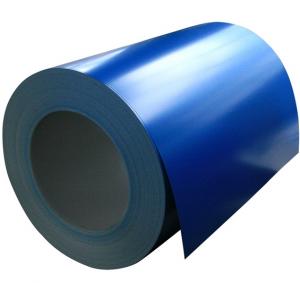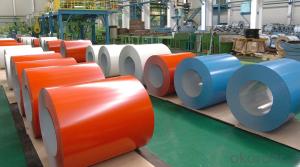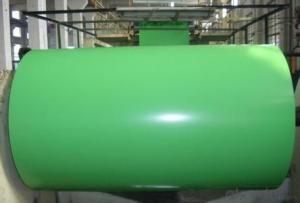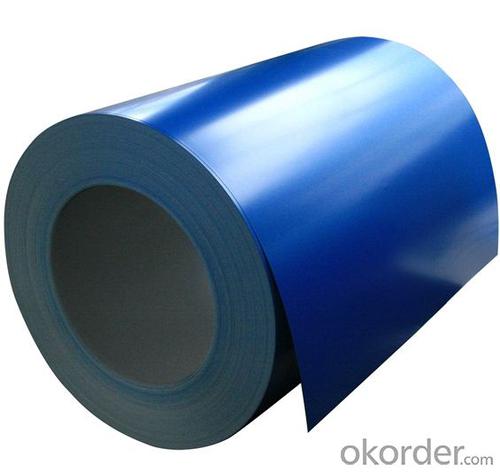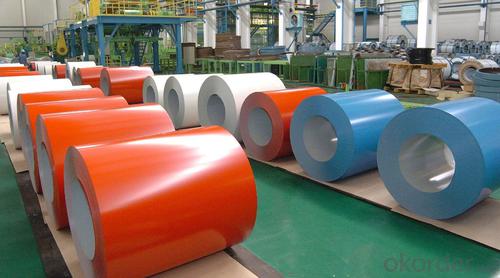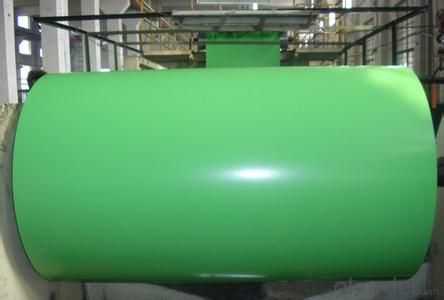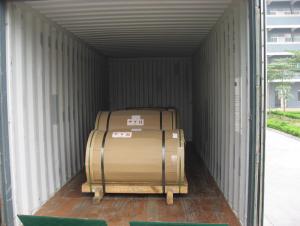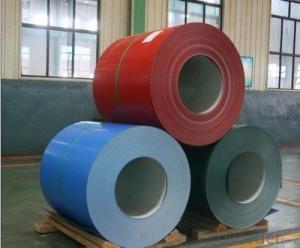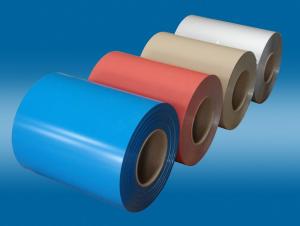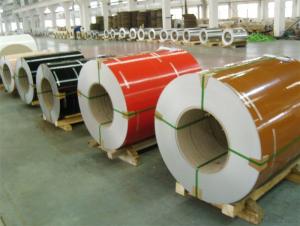Mastic Aluminum Coil 1xxx Prepainted Aluminum Coils
- Loading Port:
- China Main Port
- Payment Terms:
- TT or LC
- Min Order Qty:
- 5 m.t.
- Supply Capability:
- 10000 m.t./month
OKorder Service Pledge
OKorder Financial Service
You Might Also Like
1.Structure of Prepainted Aluminum Coils 1XXX Description
Prepainted Aluminum Coils 1XXX are of a wide range of colors, which give wonderful appearance no matter in residential and commercial constructions or great exhibition centers.
Prepainted Aluminum Coils 1XXX have been widely used in the fields of construction and decoration, electronic applications, lighting decoration, air-condition air pipes, sandwich panels and drainages etc.
2.Main Features of Prepainted Aluminum Coils 1XXX
• Superior quality of raw material
• Reasonable and stable chemical composition
• Accurate tolerance
• Goode mechanical property
3.Prepainted Aluminum Coils 1XXX Images
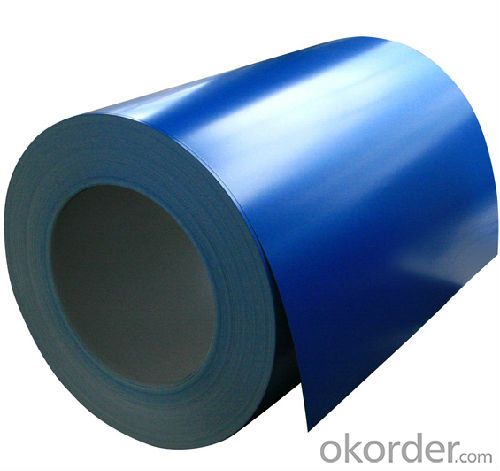
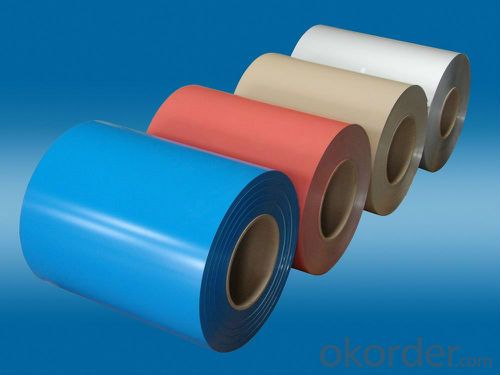
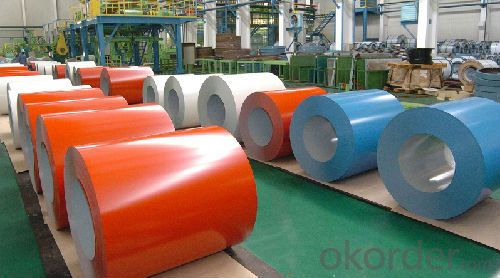
4.Prepainted Aluminum Coils 1XXX Specification
| Alloy | AA1xxx (AA1050,AA1060,AA1070,AA1100 etc.) |
| Temper | H14,H16,H18,H22,H24,H26,H32 |
| Thickness | 0.03mm--30mm |
| Width | 30mm--1700mm |
| Standard | GB/T 17748-1999 |
5. FAQ of Prepainted Aluminum Coils 1XXX
A.How to guarantee the quality?
Customers are welcome to our mill to visit and check the products. Besides, we can arrange a third party to test Prepainted Aluminum Coils 1XXX products.
B.When will you deliver the products?
The Prepainted Aluminum Coils 1XXX will be delivered within 35 days after receiving advanced payment or original L/C.
- Q: What are the different mechanical properties of aluminum coils?
- Aluminum coils are highly sought after for a variety of uses due to their diverse mechanical properties. Some key properties of aluminum coils include: 1. Strong: Aluminum coils are impressively strong, making them suitable for structural purposes. Their strength can be further enhanced through alloying or heat treatment processes. 2. Flexible: Aluminum coils are highly malleable, allowing for easy shaping and forming. This property enables the creation of intricate designs and complex shapes without compromising the integrity of the material. 3. Lightweight: Aluminum is known for its low density, making it one of the lightest metals available. This characteristic makes aluminum coils ideal for industries like aerospace and automotive, where weight reduction is crucial. 4. Resistant to corrosion: Aluminum naturally resists corrosion, forming a protective oxide layer that prevents further oxidation. This quality makes aluminum coils suitable for outdoor and marine environments, as they can withstand harsh conditions and require minimal maintenance. 5. Good conductivity: Aluminum is an excellent conductor of both heat and electricity. This characteristic makes aluminum coils ideal for applications that require efficient heat transfer, such as in heat exchangers and electrical wiring. 6. Easy to machine: Aluminum coils can be easily machined due to their low melting point and the way they form chips. This characteristic allows for high-speed machining operations, resulting in reduced production time and costs. 7. Weldable: Aluminum coils can be easily welded using various techniques, such as TIG or MIG welding. This characteristic enables the fabrication of complex structures and the joining of aluminum components. 8. Resistant to fatigue: Aluminum exhibits excellent fatigue resistance, allowing it to withstand repeated stress cycles without failure. This quality makes aluminum coils suitable for applications subjected to cyclic loading, such as automotive components or structures exposed to wind or waves. Overall, the combination of unique mechanical properties possessed by aluminum coils, including strength, flexibility, lightweight, corrosion resistance, conductivity, machinability, weldability, and fatigue resistance, makes them a versatile material choice for a wide range of industries and applications.
- Q: What is the typical tensile strength of aluminum coils?
- The typical tensile strength of aluminum coils can vary depending on the specific grade and temper of the aluminum. However, a commonly used grade, such as 3003, typically has a tensile strength of around 20,000-30,000 pounds per square inch (psi).
- Q: This question asks for an explanation of the various materials used for coating aluminum coils.
- <p>Aluminum coil coating materials can be categorized into several types, including: 1. Organic coatings, such as polyester, acrylic, and polyvinylidene fluoride (PVDF), which offer good weather resistance and color stability. 2. Inorganic coatings, like fluoropolymers, which provide exceptional chemical resistance and high-temperature stability. 3. Metal coatings, such as zinc or other metals, used for enhanced corrosion resistance. 4. Ceramic coatings, which are known for their high durability and resistance to heat and chemicals. 5. Laminates, which combine multiple materials for specific performance characteristics. These coatings are chosen based on the intended application of the aluminum coil, such as in construction, automotive, or packaging industries.</p>
- Q: How are aluminum coils used in the production of musical instruments?
- The unique properties and advantages of aluminum coils make them widely used in the production of musical instruments. Guitar pickups are one of the main applications for these coils, as they are wound around a magnetic core and capture the vibrations of the guitar strings, converting them into electrical signals. Aluminum's electromagnetic properties make it an excellent material for this purpose, allowing for precise sensing and amplification of the instrument's sound. Not only are aluminum coils used for guitar pickups, but they are also utilized in the manufacturing of other instruments such as electric keyboards, synthesizers, and electric violins. These coils are crucial for generating and transmitting sound signals, ensuring high-quality audio output. Aluminum's lightweight nature is preferred as it doesn't add unnecessary weight to the instrument, making it easier to handle and more portable. Furthermore, aluminum coils are employed in constructing wind instruments like saxophones and trumpets. They are used to shape the tubing and form the body of these instruments. Aluminum's corrosion resistance is particularly valuable in this application, as it helps maintain the instrument's durability and longevity. In summary, aluminum coils play a vital role in the production of musical instruments by providing a reliable means of capturing, transmitting, and amplifying sound signals. Their unique properties, including electromagnetic sensitivity and corrosion resistance, make them ideal for ensuring high-performance and longevity in various musical instruments.
- Q: could you please help me find information of the element aluminum??? all the information i can get will be great... thanks very mucho.... who discovered? where can i find pictures of it?
- hi ive found this: Aluminium is a silvery white member of the boron group of chemical elements. It has the symbol Al and its atomic number is 13. It is not soluble in water under normal circumstances. Aluminium is the most abundant metal in the Earth's crust, and the third most abundant element, after oxygen and silicon. It makes up about 8% by weight of the Earth's solid surface. Aluminium is too reactive chemically to occur in nature as a free metal. Instead, it is found combined in over 270 different minerals.[5] The chief source of aluminium is bauxite ore. Aluminium is remarkable for the metal's low density and for its ability to resist corrosion due to the phenomenon of passivation. Structural components made from aluminium and its alloys are vital to the aerospace industry and are very important in other areas of transportation and building. Its reactive nature makes it useful as a catalyst or additive in chemical mixtures, including ammonium nitrate explosives, to enhance blast power. Aluminium is a soft, durable, lightweight, ductile and malleable metal with appearance ranging from silvery to dull gray, depending on the surface roughness. Aluminium is nonmagnetic and nonsparking. It is also insoluble in alcohol, though it can be soluble in water in certain forms. The yield strength of pure aluminium is 7–11 MPa, while aluminium alloys have yield strengths ranging from 200 MPa to 600 MPa.[6] Aluminium has about one-third the density and stiffness of steel. It is easily machined, cast, drawn and extruded.
- Q: How do aluminum coils contribute to sustainable manufacturing?
- Aluminum coils contribute to sustainable manufacturing by offering numerous environmental benefits. Firstly, aluminum is a highly recyclable material, meaning that the coils can be reused repeatedly without any degradation in quality. This reduces the need for virgin aluminum extraction, saving energy and resources. Additionally, the lightweight nature of aluminum coils reduces transportation costs and fuel consumption during shipping. Furthermore, aluminum is corrosion-resistant, leading to longer product lifespans and reducing the need for frequent replacements. Overall, the use of aluminum coils promotes sustainability through efficient resource utilization, reduced emissions, and increased product longevity.
- Q: Is there any legislation or regulation governing the use of aluminum coils within specific industrial sectors?
- <p>Yes, there are regulations on using aluminum coils in certain industries. These regulations often vary by country and industry. For instance, in the food and beverage industry, aluminum coils may be subject to food safety standards to ensure they do not contaminate products. In construction, they might need to meet building codes and specifications for strength and durability. The aerospace industry has stringent regulations regarding the materials used in aircraft parts, including aluminum coils. Compliance with these regulations is crucial to ensure safety, quality, and to avoid legal penalties.</p>
- Q: What is the typical thickness tolerance for aluminum coils?
- The typical thickness tolerance for aluminum coils can vary depending on the specific requirements and industry standards. However, in general, the typical thickness tolerance for aluminum coils is often specified within a range of +/- 0.002 to 0.005 inches. This means that the actual thickness of the aluminum coil can deviate from the specified thickness by a maximum of either 0.002 or 0.005 inches, depending on the specific tolerance requirements. It is important to note that these tolerances can also be expressed as a percentage of the specified thickness, typically ranging from 4% to 8%. These tolerances ensure that the thickness of the aluminum coil meets the desired specifications and allows for a certain level of variation that is within acceptable limits for the intended application.
- Q: Can aluminum coils be used in packaging industries?
- Yes, aluminum coils can be used in packaging industries. Aluminum is lightweight, flexible, and has excellent barrier properties that protect the packaged products from moisture, oxygen, and light. It is commonly used for packaging food, beverages, pharmaceuticals, and other consumer goods due to its durability and ability to preserve product quality.
- Q: This question asks about the differences between 3D printed aluminum coils and traditionally manufactured aluminum coils.
- <p>Yes, there are differences between 3D printed and regular aluminum coils. 3D printed aluminum coils are manufactured using additive manufacturing, which allows for complex geometries and customization. They can be produced with less material waste and can be designed for specific applications. Traditionally manufactured aluminum coils, on the other hand, are typically made through processes like rolling, which may not offer the same level of design flexibility. 3D printed coils may have different mechanical properties due to the layer-by-layer manufacturing process, potentially resulting in varying strength and durability. Additionally, 3D printed coils might have a higher cost due to the specialized equipment and materials required for additive manufacturing.</p>
Send your message to us
Mastic Aluminum Coil 1xxx Prepainted Aluminum Coils
- Loading Port:
- China Main Port
- Payment Terms:
- TT or LC
- Min Order Qty:
- 5 m.t.
- Supply Capability:
- 10000 m.t./month
OKorder Service Pledge
OKorder Financial Service
Similar products
Hot products
Hot Searches
Related keywords
